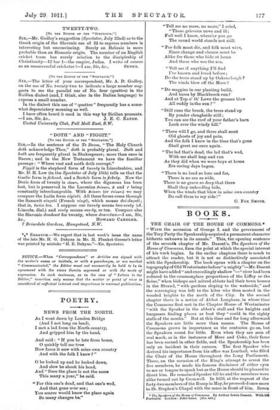" DOTH " AND n FIGGIT."
[To THE EDITOR OF THE " SPEER...ITO/1.1 Sitt,—In the sentence of the Te Deum, " The Holy Church doth acknowledge Thee," doth is probably plural. Doth and bath are frequently plural in Shakespeare ; more than once in Bacon ; and in the New Testament we have the familiar passage : " Where rust and moth doth corrupt."
Figgit is the shepherd form of twenty in Lincolnshire, and Mr. D. H. Low (in the Spectator of July 15th) tells us that the Gaelic form is fiehead, and a Scotch form is fickety. Now the Doric form of twenty is EiKsta-g, where the digamma has been lost, but is preserved in the Laconian Betscen, 13 and F being constantly interchangeable. With Seticari (or Miami) we may compare the Latin form viginti. All these forms come through the Sanscrit vingati (French vingt), which means dvi-ducati; that is, twice ten. I suppose our twenty means two-eenty (cf. Lincoln. dial.) and eenty means one-ty, or ten. Compare also the Slavonic dvadeset for twenty, where dva=two.—I am, Sir,
HOWARD CANDLER.
7 Briardale Gardens, Hampstead, N.W.






































 Previous page
Previous page